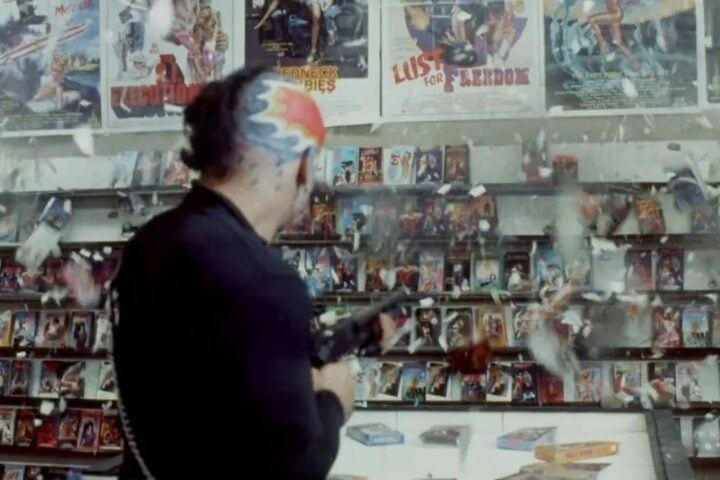Alex Ross Perry’s 2019 backstage rock drama Her Smell is bookmarked by cutaways to faux-documentary video footage, capturing its fictional 1990s alternative group in moments of camera-friendly bliss. Placed next to the emotional apocalypse that comprises most of the rest of the film’s runtime, the supposedly “real” Behind the Music-style footage can’t help but feel like an obfuscation of the band’s true story.
Perry avoids such pitfalls with Pavements, a docufiction about indie rock titans Pavement. The band’s legendary status, quickly achieved in the early ’90s indie underground, has always felt somewhat at odds with the sense of shaggy self-effacement that their critics often mistook for a conscious lack of effort. Wisely anticipating that the traditional rock-doc format would be a poor fit for such a group, Perry has crafted a far less easily classifiable tribute.
Pavements pulls together at least four different strands for its portrait of the band: a more traditional documentary-style look at Pavement as they gear up for their 2022 reunion tour; a spoof of a “big-budget Hollywood biopic” of the band; a behind-the-scenes chronicle of the production of a Pavement-themed, Perry-produced stage musical; and a report from a museum exhibition curated by Perry in conjunction with the musical. It’s an approach primarily recalls Rolling Thunder Revue: A Bob Dylan Story by Martin Scorsese, both in its conceptual innovation and in the uneven degrees to which those innovations succeed.
Perry’s film wastes little time in establishing Pavement frontman and primary songwriter Stephen Malkmus as its central figure, starting at the band’s first ending point with footage of the singer pouting his way through a live set shortly before they broke up in 1999 after the release of Terror Twilight. Intercutting that show with reunion rehearsals in 2022, Perry shows us the reflective professionalism that’s taken the place of their youthful prankishness.
The film dutifully fills us in on Pavement’s origins, from Malkmus’s association with late Silver Jews mastermind David Berman to their addition of original engineer/drummer/resident weirdo Gary Young to the impact of their first release, 1989’s Slay Tracks: 1933–1969 EP. There’s much discussion of “selling out,” its various implications, and how the very concept seems totally alien to today’s artistic landscape. It’s implied that Pavement’s resistance to fame and fortune arose more out of disinterest than conviction, but the film never quite digs into how their reunion tours fit into this equation. Guitarist Scott “Spiral Stairs” Kannberg notes that he was close to applying for a job as a Seattle bus driver before the band’s first reunion tour in 2010, raising a compelling point that the film promptly moves on from.
Perry offers his own resistance to the sellout impulse, though, with Range Life, a glossy, fictionalized Hollywood biopic in the vein of Bohemian Rhapsody. We’re shown screen tests of hot young actors trying out for the roles, with Joe Keery (Stranger Things) eventually “landing” the role of Malkmus. Tim Heidecker and regular Perry collaborator Jason Schwartzman lend some additional indie credibility to the project as Matador Records executives Gerard Cosloy and Chris Lombardi, respectively. One of the film’s running threads is the challenge of making compelling drama out of a band whose narrative, on the surface, lacks the psychological turmoil of a figure like Her Smell inspiration Courtney Love. Perry’s solution is to turn Range Life into a parody of contemporary music biopics’ anemic attempts at mythmaking.
When a fictional reporter in the film-within-a-film asks Keery-as-Malkmus about the band’s perceived sloppiness, he gives the least Malkmus answer imaginable: that singing out of tune is a radical act, and that his apparent slackerdom is actually “slacktivism.” Likewise, a fictional scene of anguished soul-searching following a disastrous real-life 1995 Lollapalooza set is juxtaposed with actual backstage footage of the band laughing the incident off.
While these scenes effectively skewer the current crop of films about cultural phenomena that undercut their very spirit by retroactively loading them with capital-S significance (looking at you, Jason Reitman), they run into the same problem as many straight music biopics: the existence of Walk Hard: The Dewey Cox Story. They amount to a tremendous amount of screen time and effort expended on a mostly one-joke premise-a joke that’s been made before.
The stage musical and museum threads also hinge on elaborate productions undertaken mostly as F for Fake-style ruses, though they point more strongly to Perry’s sincere love for Pavement’s art. Perry actually did stage Slanted! Enchanted!—a plotless jukebox musical starring Michael Esper and Zoe Lister-Jones—over three nights in New York, but it seems the project was largely for the benefit of the film. And while the director notes that he was interested in how the band’s irony-laced music would translate to the painfully earnest world of musical theater, the actual process of the indie rock-to-showtunes transmogrification remains frustratingly vague.
Of course, it’s unfair to judge each of the film’s vectors on their own merits when they each act so purposefully as parts of a whole. (Editor Robert Greene, working with an abundance of archival footage, crafts montages worthy of Pavement’s jittery, four-ideas-a-minute song structures.) Even if it’s not quite as insightful as it hopes, Perry’s humorously Cubist portrait finds a fitting balance between reverence and mischievousness. Much like Rob Javanovic’s book Perfect Sound Forever: The Story of Pavement, the film’s historical timeline is almost entirely occupied by the band’s first three albums, missing an opportunity to dig more deeply into their final years and breakup. Pavements may be a victory lap in the end, but more victory laps could stand to be as consistently engaging and inventive as this one.
Since 2001, we've brought you uncompromising, candid takes on the world of film, music, television, video games, theater, and more. Independently owned and operated publications like Slant have been hit hard in recent years, but we’re committed to keeping our content free and accessible—meaning no paywalls or fees.
If you like what we do, please consider subscribing to our Patreon or making a donation.





